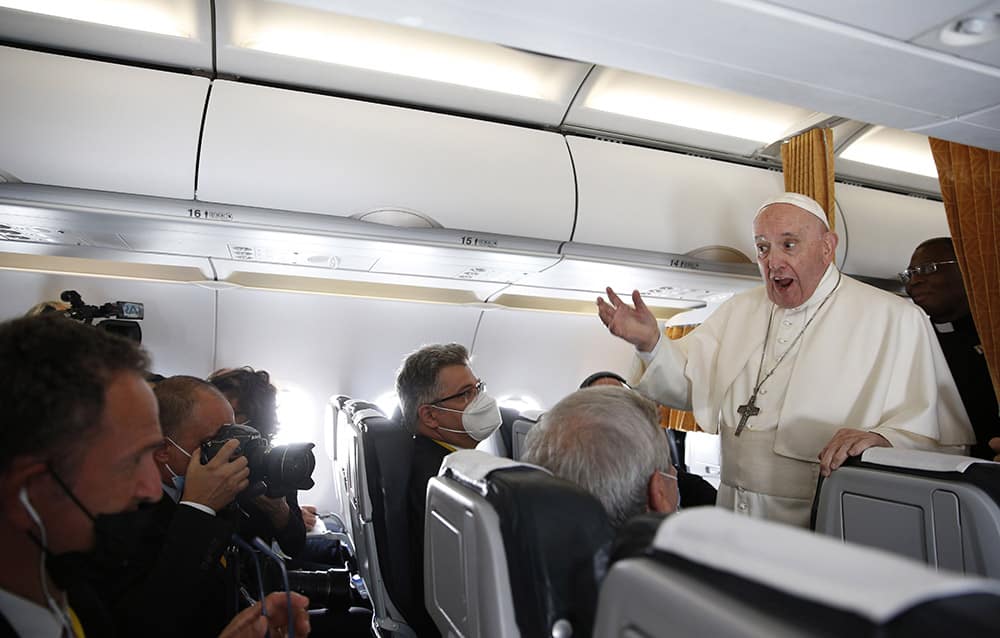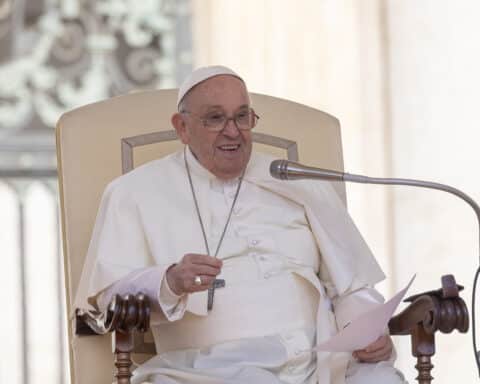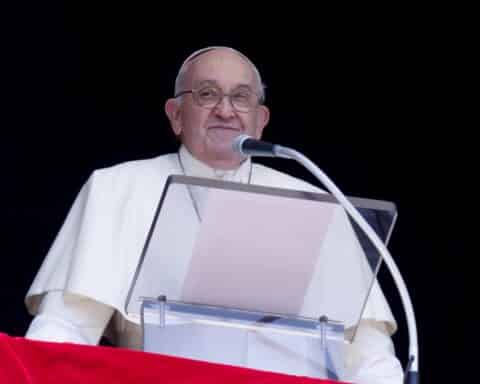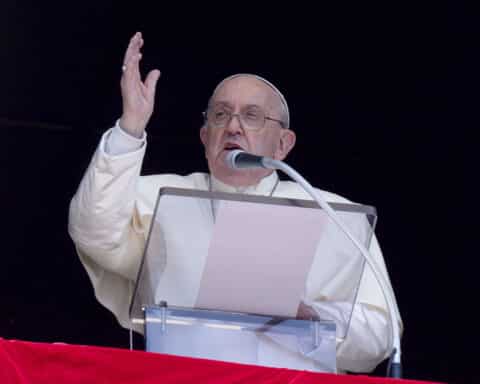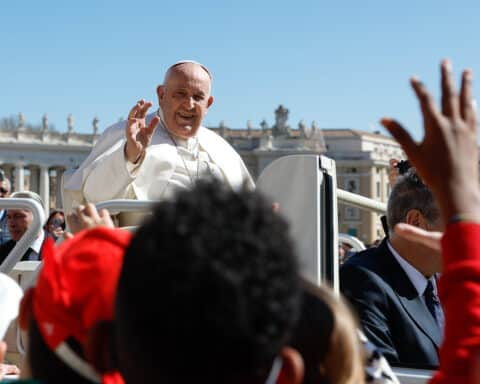Pope Francis said stuff again. It happens from time to time, and has been known to raise a ruckus when it does happen. His sayings have gotten more curious over time — more enigmatic and more niche — and this time, he’s left lots of people scratching their heads.
There’s an embarrassment of riches in the veins Pope Francis discovered during his most recent in-flight presser, but the one that caught my fancy was about Jansenism and Port Royal and Angelique Arnauld.
“Who?” you ask. “What?”
Folks, this is as Catholic-Inside-Baseball as it gets. Don’t blame me, though. Pope Francis started it. Well, Cornelius Jansen started it. The Jesuits finished it — thank God — but bad ideas die hard.
Basically, Jansenism is a school of thought championed by a Dutch bishop in early 17th-century France (modern-day Belgium) named Cornelius Jansen. Recent scholarship has tended to view Jansen and his theological school with greater nuance. Historically, however, the popular take on Jansenism has been one of opprobrium (not all of it specifically deserved, to hear more recent historians tell it). In fact, “Jansenist” has become something of a byword, a sobriquet for anyone espousing unhealthy rigorism. It’s a term of abuse, in other words, rather than a useful descriptor.
According to the popular narrative, Jansenists held that it was so difficult for persons to be “properly disposed” for holy Communion that receiving the Eucharist was — almost always, for almost everyone — morally impossible. One could hardly ever take Communion, in other words, without “eating and drinking judgment unto [oneself],” to say it with St. Paul.
To make it worse, there was practically no sense in which proper disposition could be discerned, mostly because worthiness, as Bishop Cornelius understood it, was entirely the secret and invisible work of grace, with which we mere mortals had no choice but to cooperate if we got it, and if not … not.
If you think that makes God sound more like a sociopathic puppet master than it makes him sound like a being deserving of our worship, rest easy. The Church agreed with you and condemned the five major theological propositions on which the Jansenist school rested:
-
-
- That there are some of God’s commands, which even just[ified] persons cannot keep, no matter how hard they wish and strive, and that God does not give even such persons the grace to keep them.
- That it is impossible for fallen persons to resist interior grace.
- That it is possible for human beings who lack free will to merit.
- That the Semipelagians (heretics who embraced some, but not all of the errors espoused by a the fifth-century British bishop named Pelagius) were right to teach that prevenient grace (the grace that “comes before us” and prepares us for the act of faith in God and sometimes to do good and receive the merit for it) was necessary for all interior acts, including for faith, but were wrong to teach that fallen humanity is free to accept or resist prevenient grace.
- That it is Semipelagian to affirm that Christ died for all. (Wait, what?)
- That there are some of God’s commands, which even just[ified] persons cannot keep, no matter how hard they wish and strive, and that God does not give even such persons the grace to keep them.
-
Still, Jansenism was a more popular idea than you’d think. The priests of Pope Francis’ religious order, the Society of Jesus, did yeoman’s work in countering Jansenism.
It is worth sussing out another point of similarity: the frequently toxic admixture of religion and politics. In mid-17th-century France, the wars of religion were either still raging or fresh in just about everyone’s mind. At least two of the Jesuits were courtiers — indeed, the king’s confessors — and Jansen had friends in high places, too. Suffice it to say, it was a mess.
A charismatic French abbess named Mother Jacqueline-Marie-Angélique Arnauld (not to be confused with the 19th-century French feminist Angelique Arnaud) helped make Jansenism popular. In terms of her own popularity and reach, Mother Jacqueline-Marie-Angélique was the Mother Angelica of her day. She eventually signed — under significant pressure — a document condemning five propositions of Jansenism that the Church had judged heretical.
Pope Francis invoked Jansenism and La Mère Angélique and Port Royal while he was answering a question about politicians’ “worthiness” to receive Communion, particularly when it comes to bishops’ responsibilities for safeguarding souls and the Church and the Sacred Species. That his mind went right to a 17th-century uber-intra-Catholic kerfuffle (that was ultimately about something else) is more than a little telling.
Now, here’s the thing.
The Church has always had rules about “proper disposition” for receiving holy Communion — one cannot know oneself to be in need of confession, and (ceteris paribus) must have kept the prescribed fast — and has also pretty much always been willing to grant all sorts of leeway to people who would receive, especially famous and powerful people.
When Europeans — and for these purposes, let’s count Pope Francis as one — see American Catholics getting all in a tizzy over Joe Biden receiving Communion, they wonder what all the fuss is about. They also tend to think we’re weird. None of that is to say who’s right and who’s wrong. It’s just how things are.
A few years before his election to the papacy, then-Cardinal Jorge Mario Bergoglio talked about why he didn’t like to be the minister who gives Communion. “[A]mong the faithful there are those who have not only killed intellectually or physically,” Bergoglio told his friend, Rabbi Abraham Skorka (their conversations are collected in a book titled “On Heaven and Earth: Conversations with Pope Francis” in its English translation. Some of them, he went on to explain, “have killed indirectly through the poor use of resources by paying unjust wages.”
“That is why, in certain situations, I do not give Communion myself,” explained the man who would become Pope Francis. “I stay back and I let the ministers give it, because I do not want those people to come to me for the photo op.”
“One could deny Communion to a public sinner who has not repented,” he continued, “but it is very difficult to check such things.” Sometimes, anyway.
Then-Cardinal Bergoglio went on to say that to receive holy Communion is to receive the body (blood, soul, divinity) of the Lord, the very body that makes the Church a body. “But if a man, rather than uniting the People to God, warps the lives of many people, he cannot receive Communion,” Bergoglio said. “It would be a complete contradiction.”
“Those cases of spiritual hypocrisy occur in many people who hide within the Church and do not live according to the justice that God proclaims,” he added. “They do not show repentance either,” he continued. “It is what we commonly call ‘living a double life.'”
In other words, anyone attempting to use Pope Francis’ refusal to call out politicians as cover, or a sign that everything is hunky dory with them as far as he’s concerned, has a much longer and much rockier row to hoe than the headlines suggest. Say what you will about the policy. Those are not the words of a man who is fooled.
This time around, on the plane from Slovakia, Pope Francis minced no words when it came to the evil of abortion.
“Abortion is more than a problem,” he said. “Abortion is homicide.” In case anyone listening was slow on the uptake, he added, “let’s not mince words: Anyone who aborts, kills someone.”
“This,” he also said, “is why the Church is so strict on this issue.” In case that wasn’t clear, he added: “Accepting this [practice of abortion] is kind of like accepting daily murder.”
He also said that pastors should be pastoral about this and everything. How we got to a point at which that is a controversial statement is a subject for another time, but here we are.
“The problem is a pastoral problem,” he said, contrasting it to the “simple” theological side of the problem — and it is a problem for the bishops. “If we look at the history of the Church,” Pope Francis went on to say, “we will see that every time the bishops have not managed a problem as pastors, they have taken sides about political life, about the political problem.”
“You can tell me,” he said, “[that] if you are close, and tender, and compassionate with a person, you have to give Communion — but that’s a hypothetical.” In a turn as likely to be as misunderstood as St. Augustine’s “Love, and do what you will,” which he delivered as advice to a Roman potentate who wanted to know if he should torture heretics into recanting, Pope Francis said, “Be a pastor” — i.e., a shepherd. “The shepherd knows what he has to do at all times, but as a shepherd.”
For now, it’s easier to say what “being pastoral” is not, according to Pope Francis. Whatever it is, it isn’t giving politicians a pass or letting oneself get played like a fiddle. The debate over how to deal with high-profile dissenters and opponents of reason, revealed truth and common sense will continue. No one will accuse me of being a shill for Pope Francis, but this time he’s given the bishops — and us — more to work with than one might realize at first blush.
Christopher Altieri writes from Connecticut.

